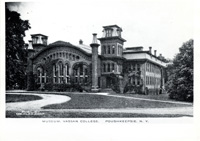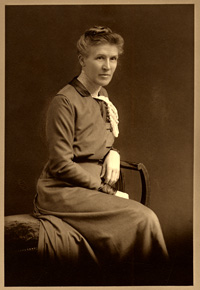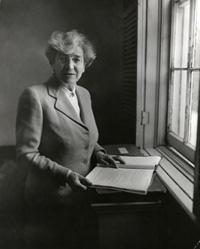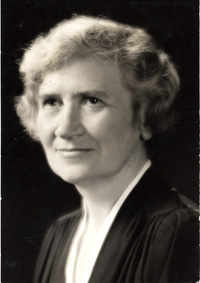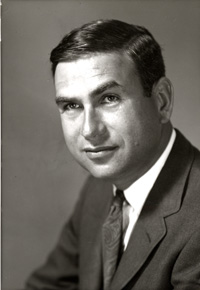The History of English at Vassar College
By Violet Edelman '12
January 2011
Department Website
Read a more detailed history of the English Department (pdf, 205K).
Throughout Vassar’s history, the English department has housed some of the most revolutionary professors on campus. Members of the department consistently forged new pathways into an evolving discipline, working to make the study of English their own and relate it to the specific demands of Vassar students. Chair Doris A. Russell wrote in 1961, “[A] reading of the letters of early students as well as of the more recent chairmen’s reports from this department cause one to realize that there has always been something experimental and pioneering about English at Vassar.” The experimental and pioneering element of English at Vassar dates from its earliest days and continues to the present time.
In Vassar’s first year, 1865, students arrived unprepared for college level work. The first professor of English, Henry B. Buckham, was frustrated with these conditions and left after one year. Thereafter, the young and open-minded Truman Backus (1866-1883) set the curriculum into a functional form. In a time where the mere existence of a woman’s college seemed revolutionary, Backus daringly encouraged the education of women and thus the expansion of Vassar. That he was forward thinking in so many capacities relating to the larger life of the College informed his chairmanship of the English Department; in her article “Some Faculty of Earliest Vassar” printed in the 1935 Vassar Quarterly, Cornelia M. Raymond wrote,
Miss Wood, who taught under Professor Backus for ten years, says of him, ‘He was a born educator. Unhampered by ruts of traditional methods of education, he dared to try experiments hazardous often in the estimation of his older, more conservative colleagues; and much of the progressive, farseeing policy that insured the success of that early period is due in large measure to him.’
An avid encourager of women’s education, Backus was just the person to take on the daunting task of setting up and expanding the department.
The first goal in establishing the department was to train students in the basics of reading and writing. After a student completed necessary preparatory work in the mechanics of sentence construction, grammar, and terminology, she entered “the college proper,” where the English department was split into four main areas: Rhetoric, Logic, Elocution, and English Literature. Backus asserted in 1873 that through this structure the department aimed to teach, theoretically, the laws of thought (logic), of expression (rhetoric), and of utterance (elocution); To train the student, practically, to a good style of writing, speaking, and reading English (essays, readings, and recitations); To drill her in specialties of the English word and sentence (etymology, synonyms, analysis of sentences); To introduce her to English literature.
The only assignments were “themes”– short analytical essays written three times a week, often unrelated to specific class materials. Private “interviews” with professors were extremely important in accomplishing the listed goals.
In the early years, the department comprised a single Professor, three assistants and one elocution teacher. The assistants supplemented the professor’s work by teaching courses, holding individual interviews with the students, and assigning and marking the students’ themes. Women consistently held subordinate positions to men in the early years, since female scholars didn’t have access to graduate degrees; the assistants were usually women who also acted as disciplinary figures under the direction of Lady Principal Hannah Lyman, placing a strain on their intellectual pursuits. Once the curriculum was in place, the department expanded to include more professors. As the women’s movement evolved on and off campus, female teachers gradually gained more respect and higher status.
The most notable writer to emerge from the early department was Elizabeth Williams Champney, class of 1869. In her Three Vassar Girls series, she wrote stories about the kind of intrepid women who went to Vassar, thereby enlightening other women about the possibilities beyond the limited world they knew.
Vassar alumna, English professor (specializing in Romantic poetry), and eventual department chair, Laura Johnson Wylie ushered in a new era of intellectual enterprise at the turn of the 20th century. One of the first women to attain a Ph.D. from Yale and an ardent advocate of women’s rights, she was a true pioneer. She shaped the educational vision of the department into the form it still holds today. As a colleague wrote in 1924, the year after Wylie’s retirement, “Whatever changes in our work the progress of education may demand, we shall never wish to depart from the fundamental principles on which Miss Wylie founded the present department of English at Vassar.”
Wylie redefined the concept of English as an individual and expressive art form, completely revolutionizing the earlier goals of work in English at Vassar. She thus motivated a transition from teaching the nuts and bolts of writing to teaching the student on a personal level. She wrote in her article entitled “What Can be Done About It” in the July, 1918 Vassar Quarterly, “[T]eaching, aiming at nothing less than the fullest individual development of every student must read failure unless we provide in it for the personal opportunity that is of its very essence…. [I]t is indeed only when teachers are people teaching classes made up of other people that there can be in the long period of learning any genuine ‘life and hope for future years.’” Her commitment to emphasizing the personal development of the student and her desire to open new doors meant what a former student, quoted in Katherine Warren’s 1924 article, “The Retirement of Miss Wylie,” praised: “[H]er personal interviews with her students, deservedly famous, were sometimes epoch making in their intellectual lives…. She often sent girls out with a new vision of what their intellectual life might really become and a new courage to achieve it.”
In her quest to establish a personal relationship between the student and her studies, Wylie and her long-time friend and colleague, Gertrude Buck (1897-1922)1 , introduced an experiential study of literature and writing to the Vassar education. In “What Can be Done About It,” Wylie wrote,
Our students when they write must appeal to their own experience;--we almost dare to believe, on the strength of overwhelming evidence, that the written word to be effective must be sincere. But what of the reading of our students?—is their knowledge of literature to be limited by a horizon helplessly narrow? And so we ask ignorance to come to knowledge, the experience of youth to the experience of maturity, in the vain hope that somehow understanding may be imposed from without, that by contact with one or another piece of great literature, our students may form for themselves a standard which their taste may later develop.
In literature courses Wylie helped students look at literary texts through the lens of their own experiences, while in rhetoric classes Buck taught them to argue persuasively by communicating experiences through exposition. Wylie and Buck thus reoriented the department to focus on experience in all senses: from improving the individual student’s experience in the classroom to encouraging writing that sprang from and reading that spoke to individual experience.
Wylie used the personal experience of literature to open up her scholarship to other disciplines. Katherine Warren observed that “the realization toward which she was leading [her students was] that every field of work, no matter how apparently restricted, opens out and still out onto the field of scholarship, and beyond that into life itself….[T]he study of a power is essentially the study of poetry and of mankind.” Laura Wylie wanted to relate her students to their world artistically, teaching them to analyze experiences in conjunction with their social and political settings. In her 1918 report to the president, she asserted that the English department should remember that “though the college is an institution for a training idler and less practical than that of any technical or professional school, its work should be vitally related to the interests and needs of the students as members of society.” Training the student to study English as an art not isolated from but inherently connected to social expression remained consistently important to Wylie’s teaching. A colleague summarized her work at the college: “The most remarkable aspect of her career here seems to me to be her enlightened view of the teaching of English as essentially the development of the individual up to the point when his imaginative life finds social expression.”
Wylie worked to align the practice of the whole department with her vision of education. To foster unity she held departmental meetings more frequently than any previous chair. She also expanded the breadth and depth of various courses, introducing advanced courses to articulate a more developed program of study and increasing opportunities for students to select their own courses to allow room for more distinct individual scholarship. Most significantly, she ensured that all courses focused intensively on writing. Wylie wrote of the required writing assignments before her time in the 1900 departmental report, “Students were not required to relate this writing to the courses they took, so that there was very little effort for synthesis of knowledge and skills in writing.” Altering this unsatisfactory trend, she wrote in a later departmental report, “Imaginative writing, the criticism of literature, and linguistic study have been an integral whole here, and most of our teachers are able to teach in at least two fields. In the writing courses and literature courses, writing has often been the approach to the appreciation of literature.”
In promoting the centrality of writing, Wylie laid the foundation for the modern Freshman writing seminar. To introduce first year students to her new approach to English, Wylie shifted the freshman English course from its focus on basic skill and terminology to writing and reading from experience, achieved in small classes taught by a strong professor who could bestow individual attention upon each student. Wylie wrote in a 1910 article for the Evening Post, “English Course at Vassar: A Statement by the College Department,” that the course fulfilled an old-fashioned endeavor to teach and to teach individual members of the class. Such endeavor, conditioning as it does every detail of our freshman course, has gradually given it what seems its peculiar character, that of no mere embodiment of abstract theory, but rather of a vital and constant varying response to the actual needs of actual students.
From Wylie’s English department, a number of notable graduates emerged that seem to have taken her visions to heart: Emily Jordan Folger (1879), a philanthropist and Shakespeare scholar who designed and endowed the Folger Shakespeare Library, novelist Jean Webster (1901), who asserted that Vassar’s freshman writing course taught her how to write and who based her novels2 on her college experiences; imagist poet Adelaide Crapsey (1901), inventor of the cinquain form in poetry; poet Edna St. Vincent Millay (1917), pioneering a new tradition while influenced by the Romantics; and anthropologist Ruth Fulton Benedict (1909), a young poet who went on to change the field of anthropology for women3 .
After Wylie’s retirement, a generation of female professors both upheld and developed her ideals through the first half of the twentieth century. Helen Drusilla Lockwood (1912) stood at the forefront of this group, as a professor in the English department from 1927-1956 and chair for six years at the end of her career. Her influence remains a remembered legacy at Vassar today. If Wylie related literature to experience in the real world, Lockwood focused on using that relationship to enact social change. As her former student Josephine Gleason wrote, “[H]er view of English as an art that begins in experience and gives form and vision to it was not unique in her department. But... her strong social interests gave a particular push to her efforts to bring her students to an understanding of the dynamics of a work of the imagination.”
Hoping to use rhetoric and writing to perpetuate social change, Lockwood was passionately interested in public discussion and debate. She introduced courses dealing with this idea, such as “The Contemporary Press,” and “Public Discussion,” and “Today’s Societies.” Like Wylie, she treated each discipline as part of a greater academic whole, inventing a number of interdisciplinary courses. Her 1953 seminar on American Culture inspired the eventual founding of the American Culture program, which she also supported by a generous bequest.
Lockwood also encouraged writing from experience. She linked this pursuit to the goal she and Wylie shared of closing the infamous gap between “town and gown.” Vassar Historian Elizabeth Daniels remembers Lockwood asking all her students on the first day of her freshman course to take a walk in Poughkeepsie and write about what they saw. She wanted them to involve themselves in the world beyond Vassar’s gates through experiential writing. She believed that encouraging this personal development of the student and her relationship to society was integral to the freshman writing seminar; in her 1955 departmental report describing the goals of the freshman course, she wrote,
The first year at a residential college is especially important, for the student is in a new environment with all her daily life reorganized. It is bound to be a time of specially heightened consciousness and bolder questioning. The student discovers freshly how her own times are related to the great tradition, how she is related to her home community and her family, how the different aspects of college are related to her and to the arts, and how she needs other people and can contribute to them. She approaches reading, writing and speaking with a view to attaining deeper mastery of them and an enlarged philosophy of language and form in relationship to other disciplines and to life.
Helen Lockwood, along with professors like Rose Jeffries Peebles (Professor from 1909-1952) 4 , Helen Sandison (1913-1950), Anna Kitchel (1918-1943), and Barbara Swain5 (1926-1963), among others, adopted and developed the principles of pedagogy espoused by Wylie that have remained integral to the college in the legacy of innovative curricular ideals.
The 1930’s department produced two of its most prized writers: author Mary McCarthy (VC 1929-1933) and poet Elizabeth Bishop (VC 1930-1934). Despite her inherently contrary attitude, elements of McCarthy’s time at Vassar shaped the writer she later became. In her memoir How I Grew (1987), she wrote, “A good deal of education consists of un-learning—the breaking of bad habits as with a tennis serve. This was emphatically true of a Vassar education….Vassar remade a girl. Vassar was transformational.” She found her experiences with Anna Kitchel, who taught her Freshman writing course, Helen Sandison, then chair of the department, and Rose Peebles, who inspired McCarthy to care about events in the outside world in “Contemporary Press,” particularly transformational. McCarthy despised Lockwood’s domineering presence. However, she later wrote, “[W]ith all the enmity I felt and possibly still feel for Miss Lockwood, looking back on her, I can now see that she embodied in her aggressive way faculty traits that could be found even in the mildest of teachers.”
Elizabeth Bishop was a contemporary and friend of Mary McCarthy’s; they worked together on a rebel literary publication, Con Spirito. Bishop also had a complex relationship with the college because of her shy and withdrawn nature, which caused her college years to be fraught with social anxiety. However, as her biographer, Brett C. Millier, writes, “Elizabeth never strayed far from the authors, ideas, and convictions she developed [at Vassar]….More important, she learned at Vassar that she could have a literary career despite the limitations of gender.” While Bishop also disliked Lockwood, she formed important relationships with Professors Barbara Swain and Rose Peebles. Swain recognized early on that this eccentric student was “doomed to be a poet.”
In the 1940’s, World War II inspired a sense of duty to nationwide needs, bringing the social function of English encouraged by Wylie and Lockwood to the forefront of the department’s awareness. The war challenged the faculty to relate their discipline to some greater function; the department re-oriented its focus to “(1) Training in articulateness, clarity of writing, understanding of propaganda, ability to state general and national aims, learning to think, (2) preservation of cultural values, (3) increase of internal resources and maintenance of national morale.” One student remarked that studying English led to, “an understanding of ‘more life than one’s own’;” another claimed it worked towards “establishing a basis of communication in times of war and discord, when communication and understanding between people are so necessary to personal equilibrium.” In a final affirmation of the English major’s social relevance, Chairman Barbara Swain’s report at the end of the 1946/47 academic year reads, “[W]e believe that the heart of the English teaching problem is to establish a relationship between language and actuality.” The department’s theories of education were geared towards training readers and writers who could employ their skills in their setting and, in so doing, serve their country.
The late 1950’s saw a period of intense change due to economic problems brought about by low enrollments as the possibilities of married life after college consumed many young women and disengaged them from academic pursuits. An effort to preserve the economy of teaching and engage dispassionate students in greater depth challenged the department’s traditional educational objectives. In response, requirements were increased and general freedom decreased. Freshman class size expanded to admit more students, inhibiting the individually oriented conception of the freshman course. A turnover in faculty also threatened the survival of the department’s inherited ideals. In his 1959 report, Chair Richard A.E. Brooks mourned the end of a valued lineage:
There has been no attempt to enforce a departmental view or gospel on our younger colleagues though some of our elders hold earnestly and deeply to a philosophy of teaching English at Vassar which largely derives from Gertrude Buck and Laura Wiley in the first two decades of our century and from the galaxy of able women who staffed and led the department from 1920 to 1945.
By 1960, the era of Laura Wylie, Gertrude Buck, Helen Lockwood, Rose Peebles, Helen Sandison, Anna Kitchel, and Barbara Swain had ended. With the addition of eight visiting professors without any personal history with the department, it lost cohesion. In 1959, Richard Brooks noted, “As a department we are in a state of significant transition, we know; but it is not altogether clear what the department will be like ten years hence.”
The increase in guidelines meant to encourage women’s education elicited disinterest or criticism from prospective and current students. The curricular changes that followed in the 1960’s and 1970’s increased student’s academic freedom. In English, the requirements for concentration were both decreased and made more general, allowing for a greater level of self-selection in the individual student’s course of study. Inter- and multi- disciplinary approaches and Independent work received continued encouragement. In response to student requests, the department offered more courses in modern literature.
During this time, current events affected academic performance and encouraged a transformation of educational vision in the English department. Caroline Mercer, department chair and specialist in Romantic poetry, energetically restored the ideals that were threatened with extinction in the late 1950’s by redefining them to fit this new context. In 1969, Mercer wrote that some students “are lonely or enraged, or obsessed by the misery of the world – one need not repeat the things we have seen in these months of 1968-69. But all students need still to know what honesty involves by way of experienced life, disciplined thought, and an understanding of language. Here is where we have our opportunity.” She saw English as a means to reawaken students by allowing them to channel their intellect and emotions meaningfully in a difficult political and social context through artistic expression in academic work. Forging a strong relationship between students’ experience of the world and their work in English reclaimed its priority, especially in the freshman course. Mercer explained, “If we continue to make the student the center of freshman English, as I trust we will, we will have to find imaginative and fruitful new ways of relating the student’s experience to the written word—to his own and to the writings that we ask him to study.” The department once again saw writing as a means for social expression, so that the earlier concept of English as an art with the potential for expressing personal experience was reawakened and expanded to fit the times.
A great diversification in faculty, courses, and approaches to the discipline characterize the recent history of the department. Starting in the 1960’s, a new awareness of racial and social diversity encouraged the introduction of courses in cultural and ethnic studies in the curriculum. During the 1980’s, creative writing emerged as a field of study more distinct from literature courses. In recent years, new faculty appointments and the introduction of various special programs have expanded the range of topics offered and approaches to the discipline they encouraged. These include exchanges with York University and Exeter University in England, and the growth of courses cross-listed with other departments. Recent course introductions have provided a more unified departmental vision in light of this diversification and expansion. English 220/221, for example, first taught in 2003/04, was designed to give a comprehensive overview of the discipline. It was required for majors and also sought to ensure a communal experience all majors would share. Five members of the department taught it. The goal of the course was to help provide majors with a map to an increasingly diversified and fractured discipline. Yet there seemed to be too wide a range of approaches to provide any succinct map of the department, and it was eliminated after its second year. Similarly, the 2005/2006 introduction of more rubric courses (“Literature, Gender, and Sexuality,” “Transnational Literature,” and “Word and Image”), taught by professors with varying points of view, attempted to vitalize and centralize neglected and emerging areas of the discipline; the focus of the courses shifts from year to year. Additionally, a new requirement for a course covering materials in Race/Ethnicity/Gender/Sexuality emphasized newer ideas and approaches in the major.
The history of the English department is still in the making. Laura Wylie and her successors created a lasting framework by opening the study of English to a general approach that worked to connect all levels of human experience, ultimately striving to shape that experience through artistry with language. At the present time, professors and students continue to re-imagine this vision and adapt it to contemporary circumstances thus maintaining the integrity and value of a Vassar education in the liberal arts.
Many thanks to Professor Beth Darlington, who guided me through the processes of researching, writing, and rewriting this piece– I could not have produced this history without the invaluable time and energy she devoted to the project. Thanks also to Professors E.K. Weedin and Elizabeth Daniels for their very helpful advice.
Read a more detailed history of the English Department (pdf, 205K).
References
- 1. Buck was also interested in drama as an aspect of the English education; in keeping with her view of the study of English and its relationship to experience, she saw drama as a way to further the experiential and thus embodied element of literature. She set the foundations for the eventual development of the academic Drama department carried out by Winifred Smith and later Hallie Flannigan.
- 2. Such as When Patty Went to College (1903) and Daddy Long Legs (1912).
- 3. She published many groundbreaking works, among them Patterns of Culture (1934) and The Chrysanthemum and the Sword (1946).
- 4. Her colleagues noted that along with Laura Wylie, she had “deep conviction of the rightness of sustained, advanced, independent work for all students, the plodding as well as the brilliant.”
- 5. In her 1950 departmental report to President Sarah Blanding, she wrote, “[T]he kind of writer that the English Department would like to train must be a woman whose whole personality is involved in her writing. She must think clearly about emotions, and feel strongly about ideas.” Her works demonstrate her connection to Wylie’s pedagogical values
Sources
- The Curriculum of the English Department, 1865-1990, Vassar College Special Collections (VCSC).
- Vassar College Course Catalogues, 1865-2010.
- Archives Files 2.39-2.48, English Department Reports, VCSC.
- Subject Files 9.24-9.28, 10.41-10.43, English Department, VCSC.
- Biographical File, Truman Backus, VCSC.
- John H. Raymond: "A College for Women, in Poughkeepsie, N.Y.," 1873, Vassar Encyclopedia.
- "Elizabeth Williams Champney," Vassar Encyclopedia.
- Biographical File, Elizabeth Williams Champney, VCSC.
- "Laura Johnson Wylie," Vassar Encyclopedia.
- Laura J. Wylie Collection. Box 4 of 7, VCSC.
- "The Retirement of Miss Wylie" by Katherine Warren in The Vassar Quarterly November 1924 (VCSC).
- Biographical File, Gertrude Buck, VCSC.
- Henry Noble MacCracken Papers 1907-1968, Committee on the Curriculum and Annual Reports of the English Department, Boxes 17, 20, 23, 28, 30, 31, 43, 76, 77, and 84, VCSC.
- Daniels, Elizabeth A, Bridges to the World: Henry Noble MacCracken and Vassar College, Clinton Corners, 1994.
- Horowitz, Helen Lefkowitz, Alma Mater: Design and Experiences in Women's Colleges from Nineteenth Century Beginnings to the 1930's, New York: Knopf, 1984.
- Simpson, Alan and Mary Simpson. Jean Webster: Storyteller. Poughkeepsie: Tymor Associates, 1984.
- Biographical File, Helen Drusilla Lockwood, VCSC.
- "Helen Drusilla Lockwood," Vassar Encyclopedia.
- Gleason, Josephine, Dean Mace, Susan Turner. "Helen Drusilla Lockwood 1891-1971," (Folder 1). [Read at Faculty Meeting 22 Sept. 1971.] Helen Drusilla Lockwood .
- Biographical File, Rose J. Peebles, VCSC.
- Biographical File, Anna Kitchel, VCSC.
- Biographical File, Helen Sandison, VCSC.
- Biographical File, Barbara Swain, VCSC.
- Annual Reports from the English Department, Sarah Gibson Blanding Collection, Boxes 6, 17-20, VCSC.
- Coordinating Committee on Educational PolicySarah Gibson Blanding Collection, Box 25, VCSC.
- Brightman, Carol, Writing Dangerously: Mary McCarthy and Her World, Clarkson Potter/Publishers: New York, 1992.
- McCarthy, Mary, How I Grew, Harcourt Brace Jovanovich, Publishers: London, 1987.
- Brazeau, Peter and Fountain, Gary, Remembering Elizabeth Bishop, 1996.
- Millier, Brett C, Elizabeth Bishop: Life and the Memory of It, 1993.
- "Elizabeth Bishop," Vassar Encyclopedia.
- Epstien, Daniel Mark, What Lips my Lips have Kissed: The Loves and Love Poems of Edna St.
- Vincent Millay, Henry Holt and Company, New York: 2001.
- "Jean Webster," Vassar Encyclopedia.
- "Adelaide Crapsey,"Vassar Encyclopedia.
- Caffery, Margaret M, Ruth Benedict: Stranger in this Land, University of Texas Press: Austin, 1989.
- "Ruth Benedict" Vassar Encyclopedia.
- Annual Reports of the English Department and Curriculum Committee Files, Alan Simpson Collection, Boxes 25,26, 41, 44 and 45. VCSC.
- Annual Reports of the English Department, Virginia B. Smith, Boxes 12 and 13, VCSC.
- Interview with Professor Peter Antelyes.
- Interview with Professor Robert DeMaria.
- Interview with Professor Paul Russell.
- Annual Reports, 1984-2009, VC English Department.

